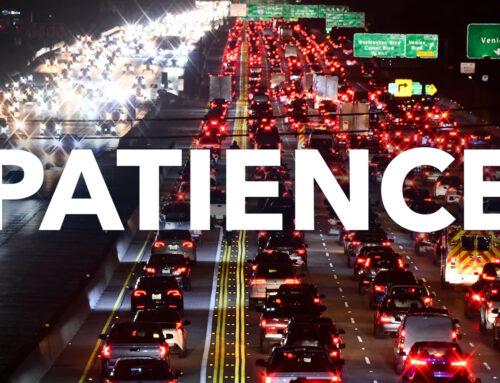Are you ready to get stressed out? Here it goes:
Credit card debt.
Mortgage debt.
Student loan debt.
Medical debt.
Apparently the overall American household debt hit a record $16.9 trillion by the end of 2022, which is up $2.75 trillion since 2019. If you write that out on paper, it’s: $16,960,000,000,000.
Debt is crushing. Debt is stressful. Debt makes you feel trapped. And at a certain point, debt just keeps piling up and it becomes more and more hopeless that we’ll ever actually pay it off.
That’s exactly what happened to the servant in our Gospel parable today.
There we meet a man who has somehow managed to run up an astronomical, mind-blowing debt of ten thousand talents, which is really quite difficult to convert into modern money (the internet tells me it could be anywhere between $1 billion and $11 billion) …At any rate, it works out that he owes the King roughly 60 million days wages…. Or close to 200,000 years worth of work.
Yeah, good luck buddy. He ain’t paying that off!
This servant is in big trouble!!!!
Still, we need to give him some credit. When finally confronted by the king about his unbelievable tab, the servant dares to fall down on his knees and says to His Master: “Be patient with me, and I will pay you back.”
And as we heard, the King is ‘moved with compassion,’ and shockingly forgives the man’s entire debt.
Jesus’ parable is obviously talking about something much bigger than financial debt. Money, in the end, amounts to absolutely nothing. This is a spiritual debt Jesus is referring to. A moral debt…
The language of “debt,” of course, is the language of justice. The cardinal virtue of justice can be summed up in this statement:
“To give to others that which is due to them.” In other words, to give people what they deserve.
In strict justice, our family, our friends, our neighbors, and yes — even our enemies — deserve our respect and goodwill. We owe everyone fair treatment — to do unto others as we would have them to do us — we owe people dignity, honor, gentleness, kindness, basic material provisions, and so forth.
We owe all this to our neighbors.
But what about God?
According to strict justice, what do we owe the Lord of the universe?
In a word: Everything.
We owe Him our allegiance. Our love. Our surrender. Our worship. Our absolute obedience. Our constant attention. We do not belong to ourselves. We belong to Him. He made us. Therefore, our heart, mind, and will are not our own to do with what we will — but they truly belong to God in a total and complete way.
As St. Paul put it in our second reading: “If we live, we live for the Lord, and if we die, we die for the Lord.”
The question then is: Have we given God everything we owe Him?
If we’re honest… like really honest… every single one of us should know the answer:
“No.”
We haven’t. None of us has loved God as much as He deserves to be loved. We all find ourselves in the Lord’s debt. “All have sinned and fall short of the glory of God!”
The truth is: We all need to come to the realization that we are in over our heads, up to our eyeballs — 10,000 talents… Billions upon billions of spiritual dollars… in debt to the Lord Almighty.
So what’s to be done? What hope do we possibly have to pay back what we owe to our Lord and King?
St. Anselm of Canterbury, who lived way back in the early 1100’s, once posed this question as well … and it led him to formulate one of the most persuasive and influential descriptions of Christ’s atonement that the Church has ever articulated.
St. Anselm starts off by saying that whoever does not honor God sufficiently… whoever doesn’t love and serve Him as He actually deserves… sins against God. Whoever sins, Anselm then says, offends against the infinite majesty of God, and so every sin is (in a certain sense) an infinitely grave offense.
This means that the sinner “owes” God something infinite. He finds himself in “infinite debt” so to speak.
Now, if that is the case, then ONLY God, who is Himself infinite, is capable of making up for that infinite debt… of satisfying it… of reconciling us and restoring justice. God can’t just ignore it or pretend it doesn’t exist. Justice, after all, still must be upheld!
And so… it was necessary for God to become man and offer to God the satisfaction for all that debt.
Jesus, the God-man, having never sinned, does not owe God death (for as St. Paul says: “The wages of sin is death”)… And so Jesus, out of supreme mercy AND supreme justice… chose to freely die, and so make perfect and complete atonement for sin.
In other words: Jesus’ act of INFINITE LOVE brings us all out of debt, and offers satisfaction for ALL sin… past, present, and future.
Dr. Scott Hahn sums this idea up perfectly in a single sentence: “Christ paid a debt He didn’t owe because we owed a debt we couldn’t pay.”
Each of us — every single one of us — owed God billions of dollars. But thank the LORD, Jesus stepped in and said: “Don’t worry: I’ll take the check.”
This is Divine Mercy!
Jesus rescued us.
We owed more than we could ever conceivably pay back… 60 million days….200,000 years of work…
We were hopeless!
But then Jesus, in His Mercy, said: “I got this.”
Jesus, although He is infinitely rich, became poor…
He paid with His Blood…
He purchased us back!!!!!
Let’s all thank Jesus together: THANK YOU, LORD!
Now if God did all that for us when we were still infinite debtors, when we were His enemies… when we were far from Him and didn’t want anything to do with Him, then how can we possibly refuse to forgive the people who have hurt us?
How can we turn to the people who are still in debt to us — a much smaller amount I might add — and start viciously choking them saying: “HEY, PAY BACK WHAT YOU OWE.”
This would make absolutely no sense.
Jesus therefore teaches us point blank: We must forgive not just seven times…. But seventy-times-seven times!
This is so hard for us to do, isn’t it??
When someone hurts us… when they take something from us, or withhold something that we are owed… whether it’s respect, love, communication, time, effort, patience, help with the kids… whatever it is: Sometimes all we want to do is to hold that debt over their heads, don’t we?
Sometimes that debt they owe us feels like the only thing we have left!
We’ve been deprived of that which we are owed, so we figure: “I’ll at least hold on to the hurt! I’ll at least hold on to my anger! To my feeling of being neglected and deprived of my rights! I’ll show them how much they hurt me by clinging to my rage and my self-pity!”
This is what the first reading from Sirach spoke of: “Wrath and anger are hateful things, yet the sinner hugs them tight.”
Maybe it’s time we ask God in prayer: “Lord, where am I still hugging my anger tight?”
To be sure, it’s quite true that there is such a thing as righteous anger, which is defined as the proportionate response to a grave injustice or moral evil.
But to be blunt, I think we’re all way too quick to justify the rage that’s brewing within us. We’re all so fast to explain our wrath away as the necessary and proper response to whatever situation we’re facing…
More often than not, our anger really isn’t rooted in holy indignation and a sincere concern for God’s will, but instead a sort of proud impatience and a distrust of the Lord’s perfect Providence.
Let us not forget, as today’s psalm put it so beautifully: “The Lord is kind and merciful, slow to anger, and rich in compassion.”
God is slow to anger. And so should we be patient with those in moral, spiritual debt to us.
I remember I was once having dinner with some friends who now have 7 little ones: 5 boys and 2 girls, and I asked their oldest son: “So, on an average day, how many times do you have to forgive your brothers? Maybe like seven times a day?”
At this, he burst into hysterical giggling and corrected me: “Noooo, Father… a LOT more than THAT!”
So I asked: “Ok, so how many times a day DO you have to forgive your brothers?”
At this, he scratched his head, thought for a moment, tallying everything up… working out the math of what his siblings probably still owed him — and then he said, with the profound wisdom only a child could share:
“Every time.”
How many times a day should we forgive?
Every time.
There’s no number. No limit. No conditional statements necessary. Just…
Every time.
Now I know this is often easier said than done. But I trust that God is giving you the grace right now to set aside the anger and the bitterness, the impatience, and the thirst for revenge that you might still be hugging tightly…
I know that He’s giving you the grace to let go, and find deeper peace and hope. To release people from the debts they owe you.
Let’s ask for that grace and peace right now.
As we prepare ourselves to receive the Holy Eucharist today, let’s invite Jesus to heal us of our anger, and to give us greater courage to forgive.
So first, ask: “Jesus, is there anyone in my life who is making me sinfully angry?”
- Renounce unholy anger in Jesus’ name: “In the name of Jesus, I renounce all unholy wrath, and all sinful anger.”
- Forgiveness prayer: “And in the name of Jesus, I choose to forgive _____, and I release them of all bitterness and resentment.”





Leave A Comment